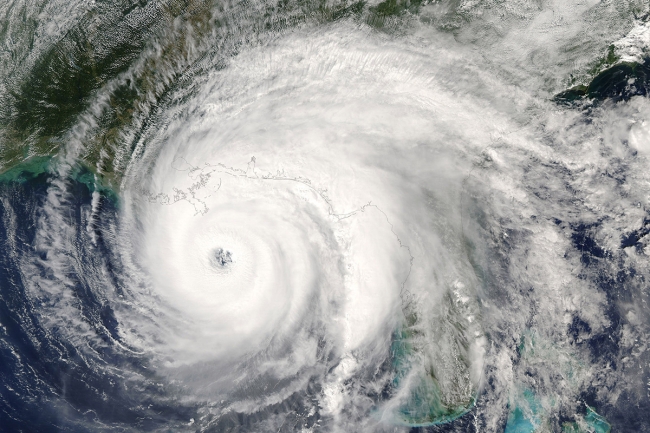You have /5 articles left.
Sign up for a free account or log in.

Zenobillis/iStock/Getty Images Plus
Extreme weather—including heat waves, hurricanes, tornadoes and heavy storms, along with associated disasters like wildfires, flooding and mudslides—are increasing to the extent that the World Meteorological Organization has referred to them as “the new normal” and The Guardian has warned that we should expect more. Such disasters often impact electricity and internet and telephone access and can force residents to evacuate. For instructors, that means we may be well served by planning for specific weather-related scenarios that can impact our virtual and HyFlex courses, as well as residential courses that move online in response to emergencies.
Online courses in particular rely on internet access and electricity, with no physical classroom, and students and instructors are geographically dispersed around the country or around the world. Members of the classroom community do not always experience the same weather, and weather events may impact individuals in ways that others in the classroom community are unaware of. This is also true for the online students enrolled in HyFlex courses. Additionally, not everyone in the class is affected equally, even when residential classes are moved online in response to a shared weather-related situation.
As online educators, we recommend that our higher education colleagues consider the following questions so that they are more prepared for situations in which extreme weather can impact their courses.
Considerations for Impacts on Students
Depending on your particular course and institution, you may want to ask your online students where they are located. You don’t need to keep track of the weather in each of those locations, but the information can be helpful in cases when a student misses class or drops out of communication. If they don’t have internet or phone access, they won’t be able to contact you, but if they are out of touch and you can check the news about their location, you may discover that residents have lost power due to storms or other weather.
If that happens, you will have some questions to consider, and it may help you to learn more about your options before a time-sensitive situation occurs.
- What kinds of extensions on assignment deadlines can you provide?
- Can you excuse their absences or provide makeup options?
- Are there trauma-informed online teaching strategies that can be helpful in this particular situation?
- Can you offer time in the class, office hours or another space for students to discuss their experiences and needs?
- Depending on the severity of the situation, your student may have long-term electricity or internet access issues, or may have lost their computer or even their home. Whom at your institution should you notify? Are there institutional resources that you can share with your student, such as emergency financial aid, an advising department or counseling or spiritual services?
Considerations for Impacts on Instructors
You may also be hit by a power outage, internet outage or something more extreme. If you are teaching a synchronous class session, that might even happen unexpectedly during the middle of class, causing you to disappear from the virtual classroom.
To help prepare for such scenarios, you may want to consider the following.
- What’s your backup plan for teaching if your building or neighborhood experiences a blackout while you’re in the middle of a synchronous class session? Is your laptop battery fully charged, do you have a charger that can power your computer and/or do you have access to a hot spot or somewhere nearby where you can reconnect? Do you have a battery-powered light that can help you avoid looking spooky on webcam? If you don’t have a teaching assistant or technical support person in the virtual classroom with you, how will your students know to wait for you to be logged back in soon? Does your web-conferencing platform close the virtual meeting room for everyone if you disconnect, and if so, how will you let students know to rejoin?
- If you’re teaching a synchronous course and your area has an extended issue, do you have a colleague who could be a guest lecturer or substitute instructor if you have to miss the next class? Does your institution offer an honorarium for guest lecturers?
- What’s your backup plan for grading, responding to emails, holding office hours or teaching asynchronously if your area has an extended issue with electricity or internet access?
- Might it be helpful to let your students know your contingency plans for the scenarios above ahead of time—for example, in your course site—so they have a heads-up about what to expect if something like this happens?
- Depending on your course topic, might it be relevant to connect your plans to the impacts of climate change or to climate justice?
- Whom do you need to notify in the administration if your course is adversely affected by weather? Can they provide you with support, and what would that look like?
Considerations for Administrators
Administrators may want to share these areas of consideration with instructors and be ready to answer the questions raised in this article. They may also find it helpful to identify responses that are specific to their department as well as link with other departments or schools within the institution to create a more cohesive plan of support. Questions to consider:
- How can my team support instructors and students who are unable to engage in class due to severe weather conditions and their aftermath?
- How can my team disseminate information about our support services prior to and during potential incidents?
- Is our team able to track the location of instructors and students and reach out when an incident occurs? For example, can we send an email to all instructors and students located in California following an earthquake? If yes, how will we know when an incident occurs, as not all local weather events receive national news attention? How will we decide which events require outreach?
- Which departments or schools can we partner with to streamline the process of providing support during such stressful times?
- How can administrators more consistently prioritize preparation and lead difficult conversations regarding the likely impacts of the climate crisis on the institution, as Joshua Kim proposed in a piece discussing The Devil Never Sleeps and Universities on Fire?
Additionally, many institutions rapidly shifted instruction while developing new protocols in response to the COVID-19 pandemic. It may be helpful to look at prior interventions and recommendations to identify and replicate practices that have best served your institutional community.
We have found that having an idea of what to do in unexpected situations can help reduce the stress of nasty surprises, and we hope these questions are a helpful starting point for thinking about the possible impacts of extreme weather on your courses.








